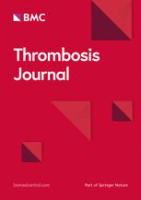
Thrombosis Journal
Scope & Guideline
Innovating methodologies for better understanding of thrombotic conditions.
Introduction
Aims and Scopes
- Clinical and Epidemiological Research on Thrombosis:
The journal publishes studies that investigate the prevalence, risk factors, and outcomes associated with venous thromboembolism (VTE), arterial thrombosis, and related conditions across diverse populations. - Innovations in Antithrombotic Therapy:
Research on the efficacy and safety of various antithrombotic agents, including direct oral anticoagulants (DOACs), low-molecular-weight heparin (LMWH), and vitamin K antagonists, as well as novel therapeutic strategies. - Mechanisms of Coagulation and Fibrinolysis:
Studies exploring the molecular and cellular mechanisms involved in coagulation and fibrinolysis, including the role of inflammatory markers, genetic factors, and biomarkers in thrombotic events. - Thrombosis in Special Populations:
Research focusing on thrombosis in specific populations, such as pregnant women, cancer patients, and those with comorbidities like COVID-19 or renal insufficiency, emphasizing tailored management strategies. - Guidelines and Risk Assessment Models:
The journal emphasizes the development and validation of clinical guidelines and risk assessment models to optimize thrombosis prevention and management in different clinical settings.
Trending and Emerging
- Impact of COVID-19 on Thrombosis:
A significant increase in research related to COVID-19 and its association with thrombotic events is evident, highlighting the need for understanding the mechanisms and management of thrombosis in infected patients. - Machine Learning and Predictive Modeling:
There is a growing trend towards the use of machine learning and advanced statistical models to predict thrombotic events and personalize thromboprophylaxis strategies, indicating a shift towards data-driven approaches in clinical practice. - Role of Inflammatory Biomarkers:
Research focusing on the relationship between inflammatory markers and thrombotic risk is gaining traction, reflecting a broader understanding of how inflammation contributes to thrombotic pathophysiology. - Thrombosis in Cancer Patients:
An increasing number of studies are addressing thrombosis in cancer patients, particularly regarding thromboprophylaxis during chemotherapy and the management of cancer-associated venous thromboembolism. - Personalized Anticoagulation Strategies:
Emerging research is concentrating on personalized anticoagulation management, including genetic testing and individualized dosing strategies to optimize treatment outcomes.
Declining or Waning
- Traditional Risk Factors for Thrombosis:
Research focusing on conventional risk factors such as obesity and immobility is declining as newer studies explore genetic, molecular, and inflammatory markers that provide deeper insights into thrombosis mechanisms. - Single-Agent Antithrombotic Studies:
The focus on studies evaluating the efficacy of single-agent antithrombotic therapies is waning, giving way to research that examines combination therapies or multi-faceted approaches to thrombosis management. - Basic Science without Clinical Application:
There is a noticeable decline in purely basic science studies that do not translate into clinical applications, as the journal increasingly prioritizes research with direct implications for patient care. - Historical Perspectives on Thrombosis Management:
Papers that review historical approaches to thrombosis management are becoming less frequent, as current research emphasizes evidence-based practices and innovations in treatment.
Similar Journals
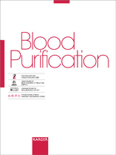
BLOOD PURIFICATION
Fostering Collaboration in Blood Purification Research.BLOOD PURIFICATION is a distinguished peer-reviewed journal published by KARGER, recognized for its in-depth exploration of the interdisciplinary topics surrounding blood purification technologies and techniques, encompassing nephrology and hematology. Since its inception in 1983, this reputable journal has provided a vital platform for disseminating groundbreaking research, reviews, and clinical practices aimed at advancing the understanding and management of blood-related conditions. With an impressive impact factor positioned within the second quartile (Q2) in the fields of Hematology, Nephrology, and Miscellaneous Medicine (2023), BLOOD PURIFICATION is highly regarded among researchers and professionals dedicated to enhancing patient outcomes. The journal aims to foster a collaborative academic environment, sharing innovative findings and methodologies, making it an essential resource for scholars, clinicians, and students alike. This publication does not currently offer Open Access options, and is based in Switzerland, with its editorial office located at Allschwilerstrasse 10, CH-4009 Basel. Engage with BLOOD PURIFICATION to stay at the forefront of advancements in blood purification science.
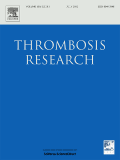
THROMBOSIS RESEARCH
Unveiling the Complexities of ThrombosisTHROMBOSIS RESEARCH is a leading peer-reviewed journal in the field of hematology, published by PERGAMON-ELSEVIER SCIENCE LTD. With an impressive impact factor and ranked within the top 10 of 137 in its category according to Scopus, this journal provides a critical platform for the dissemination of innovative research related to thrombosis and hemostasis. Established in 1972, THROMBOSIS RESEARCH has been at the forefront of scholarly communication, addressing key issues, findings, and advancements over more than five decades. Recognized for its high-quality content, the journal is categorized in the Q1 quartile for 2023, reflecting its influence and relevance within the scientific community. Researchers, medical professionals, and students engaged in the study of blood disorders will find valuable insights and the latest discoveries within its pages. Although currently not an open-access publication, THROMBOSIS RESEARCH remains accessible to a wide audience through institutional subscriptions, ensuring that vital research continues to inform and enhance clinical practices around the globe.
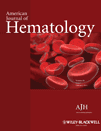
AMERICAN JOURNAL OF HEMATOLOGY
Elevating Knowledge in Blood Health and TreatmentAmerican Journal of Hematology, published by Wiley, stands as a premier outlet for the dissemination of cutting-edge research in the field of hematology. With a commendable impact factor and ranked #9 out of 137 in the Scopus medicine category, this journal has established a robust presence since its inception in 1976. Operating in the Q1 quartile for hematology, it serves as a crucial resource for researchers, clinicians, and students dedicated to understanding blood disorders and advancing treatment methodologies. While the journal does not currently offer open access options, it remains highly regarded for its rigorous peer-review process and impactful contributions to the scientific community. With coverage extending into 2024, the American Journal of Hematology is committed to fostering innovation and collaboration within the hematological sciences.
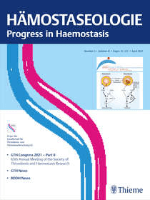
Hamostaseologie
Decoding Hemostasis: Your Source for Cutting-Edge Research and ReviewsHamostaseologie is a prominent academic journal dedicated to the field of hematology, published by GEORG THIEME VERLAG KG. With an ISSN of 0720-9355 and an E-ISSN of 2567-5761, this journal has been at the forefront of critical research and advancements since its inception in 1981, and it continues to maintain its relevance in the scientific community with a converged publication until 2024. Ranked in the Q3 quartile in Hematology for 2023, and positioned at #44 out of 137 in the Scopus Medicine Hematology category, it represents a substantial contribution to scholarly discourse. Researchers and professionals alike will find valuable insights within its pages, as it disseminates rigorous studies and reviews that address pertinent issues related to hemostasis and coagulation. While the journal does not currently offer Open Access, readers can access its valuable content through institutional subscriptions, making it an essential resource for students, clinicians, and researchers aiming to deepen their understanding of hematological science.

Research and Practice in Thrombosis and Haemostasis
Fostering collaboration for breakthroughs in hematology.Research and Practice in Thrombosis and Haemostasis, published by Elsevier, is a prominent open-access journal dedicated to advancing the field of hematology through high-quality research and clinical practice. Since its inception in 2017, this journal has established itself as a vital resource for researchers, healthcare professionals, and students interested in thrombosis and hemorrhage management, showcasing original research, reviews, and clinical studies. The journal’s commitment to accessible knowledge is reflected in its open-access model, allowing researchers worldwide to share their findings without financial barriers. With an impressive 2023 Scopus rank of #42 out of 137 in the hematology category and a respectable Q2 classification, it provides an authoritative platform for innovative ideas and cutting-edge developments in the field. As the journal continues to grow in stature, it aims to foster collaboration and knowledge exchange amongst professionals dedicated to improving patient outcomes in thrombosis and hemostasis.
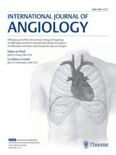
International Journal of Angiology
Exploring innovative insights in angiology and cardiology.Welcome to the International Journal of Angiology, a distinguished publication dedicated to advancing the field of cardiology and cardiovascular medicine. Published by THIEME MEDICAL PUBL INC, this journal plays a crucial role in disseminating innovative research and clinical insights from 1992 through 2024, serving as a vital resource for researchers, healthcare professionals, and students alike. With an ISSN of 1061-1711 and an E-ISSN of 1615-5939, the journal currently holds a respectable Q4 ranking in the cardiology field, reflecting its commitment to quality and relevance. Although it operates under a traditional access model, the journal ensures that critical research findings are shared with a broad audience, fostering collaboration and knowledge exchange. By exploring current trends, diagnostic techniques, and treatment modalities in angiology, the International Journal of Angiology remains an essential platform for those dedicated to improving cardiovascular health around the globe.
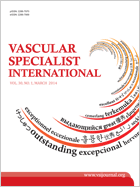
Vascular Specialist International
Advancing vascular health through global collaboration.Vascular Specialist International, published by the Korean Society of Vascular Surgery, serves as a pivotal platform in the field of vascular surgery and cardiovascular medicine. With an Open Access policy established since 2014, the journal encourages a broader dissemination of research findings to an international audience, fostering collaboration and innovation among researchers, clinicians, and students alike. The journal, ISSN 2288-7970, is headquartered in South Korea and spans a significant publication back to its inception, focusing on advancing clinical practice and research in vascular health. In the 2023 rankings, it is positioned in quartile Q4 for Cardiology and Cardiovascular Medicine and Q3 for Surgery, reflecting its growing impact within the scientific community. Furthermore, it holds commendable Scopus rankings in both categories, indicating its relevance and contributions to the field. With a mission to enhance vascular surgery practices and improve patient outcomes worldwide, Vascular Specialist International stands as an essential resource for those dedicated to advancing the science and art of vascular healthcare.

JOURNAL OF THROMBOSIS AND THROMBOLYSIS
Innovating research in cardiology and hematology.JOURNAL OF THROMBOSIS AND THROMBOLYSIS, published by Springer in the Netherlands, serves as a vital platform for research in the fields of Cardiology and Cardiovascular Medicine and Hematology. With an impressive impact factor, this journal ranks in the Q2 category for both fields according to the latest metrics, evidencing its significant influence and contribution to ongoing scholarly discourse. Spanning over three decades from 1994 to 2024, the journal provides an essential source for innovative studies, clinical practices, and comprehensive reviews related to thrombosis and thrombolysis. Researchers, clinicians, and students alike will find valuable insights and cutting-edge knowledge that address the complexities of blood coagulation and its implications in cardiovascular health. The journal is indexed in Scopus, with commendable rankings, further establishing its reputation in the academic community.

Journal of Vascular Surgery-Venous and Lymphatic Disorders
Pioneering advancements in venous and lymphatic disorders.The Journal of Vascular Surgery-Venous and Lymphatic Disorders, published by Elsevier, is a distinguished peer-reviewed journal dedicated to advancing the knowledge and practice of vascular surgery with a particular focus on venous and lymphatic conditions. With an ISSN of 2213-333X and a robust impact factor, this journal ranks Q2 in Cardiology and Cardiovascular Medicine and Q1 in Surgery, reflecting its high relevance and contribution to the field. Covering a wide spectrum of topics from innovative surgical techniques to the latest developments in venous and lymphatic disorders, the journal serves as a vital resource for researchers, clinicians, and students alike. It not only disseminates cutting-edge research but also promotes best practices and interdisciplinary collaboration within the cardiovascular domain. The journal is accessible to a global audience, ensuring that impactful findings reach practitioners and researchers everywhere, further elevating the standards of patient care and surgical excellence.

BLOOD REVIEWS
Exploring breakthroughs in hematologic and oncologic research.BLOOD REVIEWS is a highly regarded journal published by Churchill Livingstone, specializing in the fields of Hematology and Oncology. With an impressive Q1 ranking in both disciplines and placing in the top 10% of its peer categories according to Scopus metrics, it provides an essential platform for the dissemination of cutting-edge research and reviews pertaining to blood disorders and cancer treatment. Since its inception in 1987 and continuing through 2024, the journal has established itself as a cornerstone for healthcare professionals, researchers, and students who seek to advance their understanding of hematologic and oncologic topics. While not an open-access journal, BLOOD REVIEWS retains a reputation for delivering high-quality, peer-reviewed articles that foster dialogue and innovation within the scientific community. For those in the United States and beyond, the journal serves as a vital resource, housed at the Journal Production Department in Edinburgh, Scotland, ensuring accessibility and a global reach in its critical academic contributions.